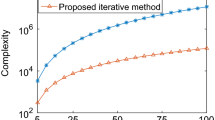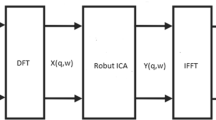Abstract
Feed-Forward (FF-) and Feed-Back (FB-) structures have been proposed for Blind Source Separation (BSS). The FF-BSS systems have some degrees of freedom in the solution space, and signal distortion is likely to occur in convolutive mixtures. On the other hand, the FB-BSS structure does not cause signal distortion. However, it requires a condition on the propagation delays in the mixing process. In this paper, source separation performance in the FB-BSS is theoretically analyzed taking the propagation delays into account. Simulation is carried out by using white signals and speech signals as the signal sources. The FF-BSS system and the FB-BSS system are compared. Even though the FB-BSS can provide good separation performance, there exits some limitation on location of the signal sources and the sensors.
Preview
Unable to display preview. Download preview PDF.
Similar content being viewed by others
References
Nguyen Thi, H.L., Jutten, C.: Blind source separation for convolutive mixtures. Signal Processing 45(2), 209–229 (1995)
Cichocki, A., Amari, S., Adachi, M., Kasprzak, W.: Self-adaptive neural networks for blind separation of sources. In: Proc. ISCAS’96, Atlanta, pp. 157–161 (1996)
Amari, S., Chen, T., Cichocki, A.: Stability analysis of learning algorithms for blind source separation. Neural Networks 10(8), 1345–1351 (1997)
Murata, N., Ikeda, S., Ziehe, A.: An approach to blind source separation based on temporal structure of speech signals. Neurocomputing 41, 1–24 (2001)
Nakayama, K., Hirano, A., Horita, A.: A learning algorithm for convolutive blind source separation with transmission delay constraint. In: Proc. IJCNN’2002, pp. 1287–1292 (May 2002)
Saruwatari, H., Takatani, T., Yamajo, H., Sishikawa, T., Shikano, K.: Blind separation and deconvolution for real convolutive mixture of temporally correlated acoustic signals using SIMO-model-based ICA. In: ICA’03, pp. 549–554 (April 2003)
Horita, A., Nakayama, K., Hirano, A., Dejima, Y.: Analysis of signal separation and signal distortion in feedforward and feedback blind source separation based on source spectra. In: IEEE&INNS, Proc., IJCNN2005, Montreal, pp. 1257–1262 (July-August 2005)
Horita, A., Nakayama, K., Hirano, A., Dejima, Y.: A learning algorithm with distortion free constraint and comparative study for feedforward and feedback BSS. In: Proc. EUSIPCO2006, Florence, Italy (September 2006)
Author information
Authors and Affiliations
Editor information
Rights and permissions
Copyright information
© 2007 Springer-Verlag Berlin Heidelberg
About this paper
Cite this paper
Horita, A., Nakayama, K., Hirano, A. (2007). Analysis and Comparative Study of Source Separation Performances in Feed-Forward and Feed-Back BSSs Based on Propagation Delays in Convolutive Mixture. In: de Sá, J.M., Alexandre, L.A., Duch, W., Mandic, D. (eds) Artificial Neural Networks – ICANN 2007. ICANN 2007. Lecture Notes in Computer Science, vol 4668. Springer, Berlin, Heidelberg. https://doi.org/10.1007/978-3-540-74690-4_18
Download citation
DOI: https://doi.org/10.1007/978-3-540-74690-4_18
Publisher Name: Springer, Berlin, Heidelberg
Print ISBN: 978-3-540-74689-8
Online ISBN: 978-3-540-74690-4
eBook Packages: Computer ScienceComputer Science (R0)




